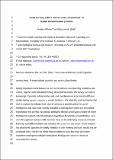Social learning, culture and the ‘socio-cultural brain’ of human and non-human primates
Abstract
Noting important recent discoveries, we review primate social learning, traditions and culture, together with associated findings about primate brains. We survey our current knowledge of primate cultures in the wild, and complementary experimental diffusion studies testing species’ capacity to sustain traditions. We relate this work to theories that seek to explain the enlarged brain size of primates as specializations for social intelligence, that have most recently extended to learning from others and the cultural transmission this permits. We discuss alternative theories and review a variety of recent findings that support cultural intelligence hypotheses for primate encephalization. At a more fine-grained neuroscientific level we focus on the underlying processes of social learning, especially emulation and imitation. Here, our own and others’ recent research has established capacities for bodily imitation in both monkeys and apes, results that are consistent with a role for the mirror neuron system in social learning. We review important convergences between behavioural findings and recent non-invasive neuroscientific studies.
Citation
Whiten , A & van de Waal , E 2017 , ' Social learning, culture and the ‘socio-cultural brain’ of human and non-human primates ' , Neuroscience and Biobehavioral Reviews , vol. 82 , pp. 58-75 . https://doi.org/10.1016/j.neubiorev.2016.12.018
Publication
Neuroscience and Biobehavioral Reviews
Status
Peer reviewed
ISSN
0149-7634Type
Journal item
Description
AW was supported during the writing of this review by the John Templeton Foundation (grant number ID40128). EvdW was supported by the Swiss National Science Foundation (grant number P300P3-151187) and Society in Science - Branco Weiss Fellowship.Collections
Items in the St Andrews Research Repository are protected by copyright, with all rights reserved, unless otherwise indicated.

